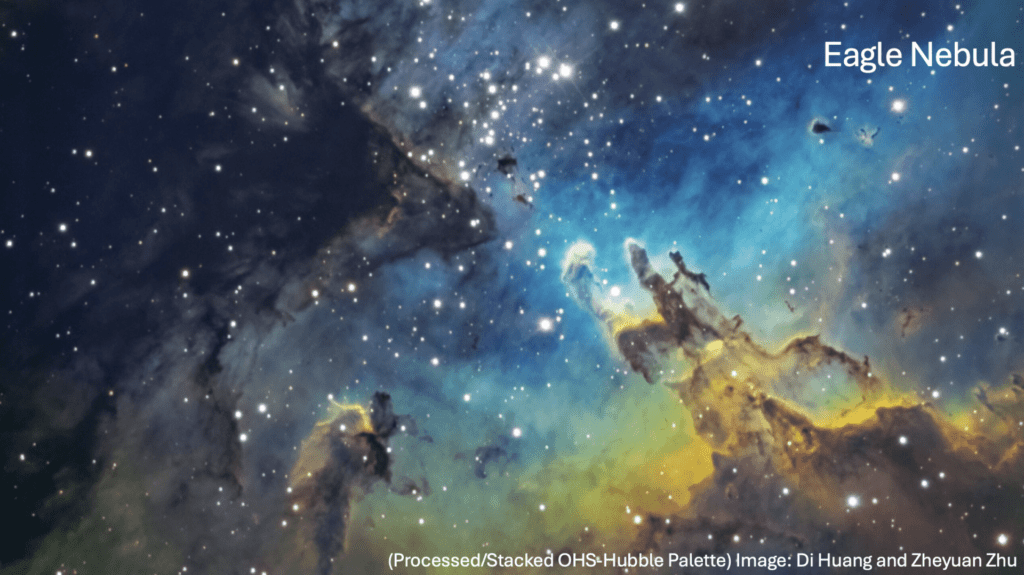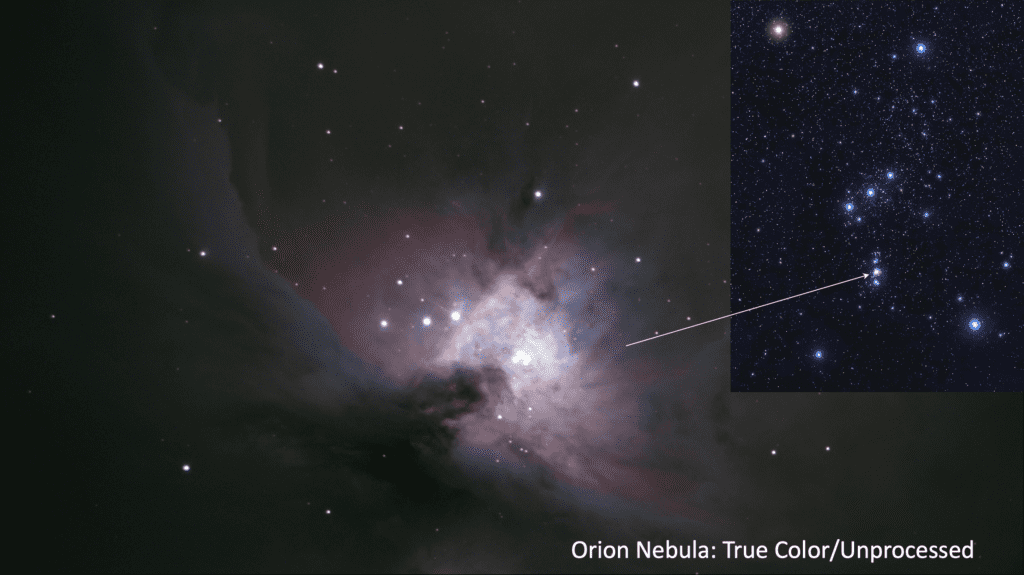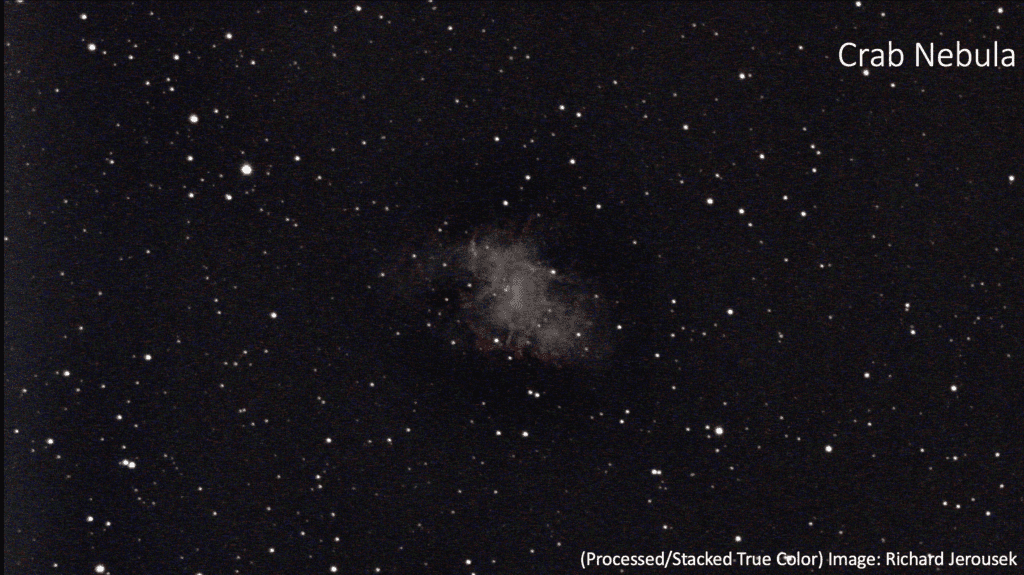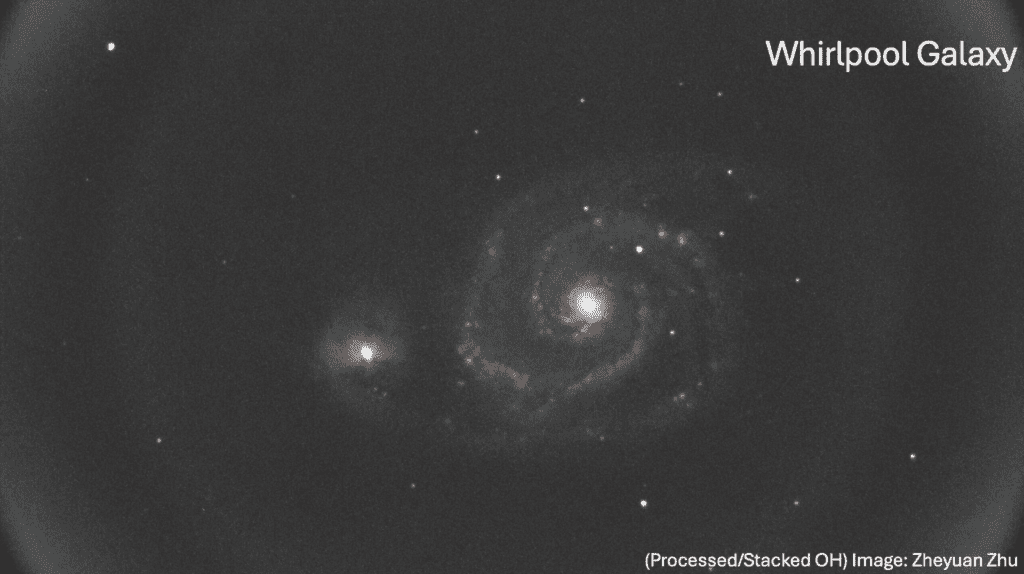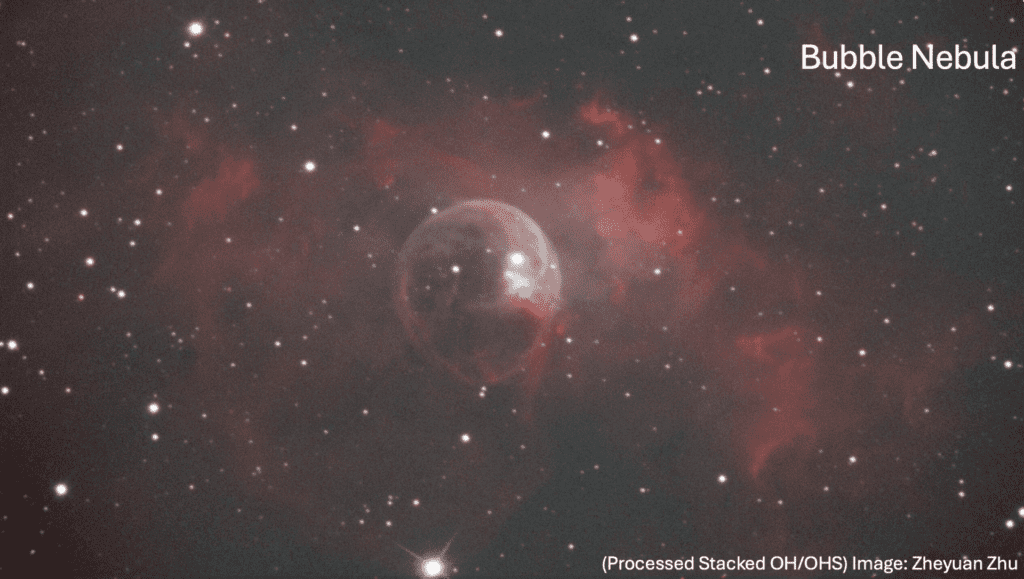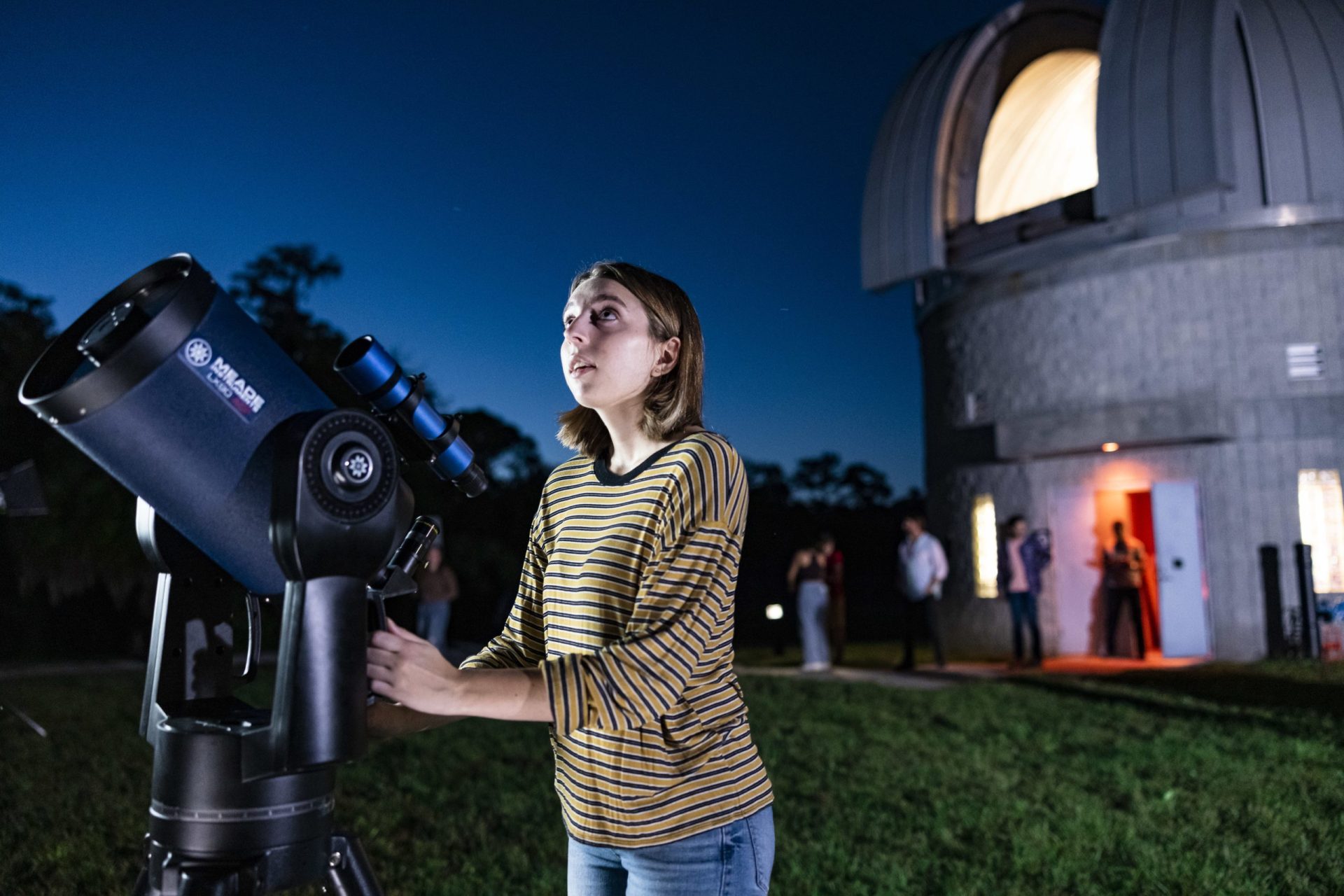
Robinson Observatory
Robinson Observatory (RO) is a research and education facility at the University of Central Florida. It is run by the faculty and students of the Planetary Sciences Group and of the UCF Astronomy Society in the Department of Physics. The current director of RO is Dr. Richard Jerousek.
We are registered with Astronomers Without Borders.
The Orlando Sentinel recommends us as a “thing you have to do before graduating from UCF.”
Public Events Schedule
One week before each scheduled event, the event times will become clickable links to a form that you can use to register.
Please reserve your space (weather permitting) by clicking the linked time you wish to attend and completing the form. We will send you an email confirming or cancelling the event a few hours before the event time depending on whether it is too cloudy or good weather for observing.
General Info About KUTS and Robinson Observatory
- Note that any times/dates that we do list would be the only times that are we are open to the public.
- Groups are limited to 5 as we have extremely limited parking and limited capacity.
- If you have any questions about KUTS, send email to RobinsonObservatory@ucf.edu.
- Please do not call the Physics Department for info about KUTS!
- Directions to the observatory are available below.
- We strongly recommend that visitors review our safety guidelines before coming to the observatory.
- All events are at Robinson Observatory itself unless otherwise noted.
- At a typical event, we set up a variety of portable telescopes — usually Meade LX90s with 8-inch primary mirrors — and point them at various interesting objects in the sky. Each telescope is staffed by a knowledgeable volunteer who can explain to you what you’re seeing, and answer any other questions you have. We also take groups of 20 at a time into the dome for a ~20 min. demonstration of our 20″ telescope capabilities and what we use it UCF. Unfortunately, there are no eyepieces to look through on this one, only cameras.
- The events are free and are open all ages of UCF and non-UCF people alike. However, minors must be accompanied and supervised by a parent or chaperone!
- As you turn on to Ara Drive and approach the observatory, if an event has already begun, we ask that you please slow down to 5 mph and turn off your headlights. Headlights temporarily impair our guest’s night vision.
- Parking at the observatory is limited. There are a couple of small parking lots within a 500 feet of Robinson Observatory. UCF Parking permits or virtual daily parking permits are required. You can purchase a virtual daily permit here.
- We strongly recommend that visitors review our safety guidelines before coming to the observatory.
- If you have any questions about KUTS, feel free to email us at email to planets@ucf.edu.
- Make sure to pick up a worksheet and complete it at the event.
- Turn in your worksheet before you leave. We’ll make sure it gets to your profes
Donate to Robinson Observatory
Frequently Asked Question Page
More
- Minor Planets Center (MPC) observatory code: W39 (Robinson Observatory)
- We are located near 28° 35′ 30.3″ N, 81° 11′ 26.0″ W (±0.2″ or so). Our lawn is at an elevation of 60 feet, though the telescope itself is at about 77 feet above sea-level. Our Open Location Code (a.k.a. ‘plus code’) is 76WWHRR5+MP.
- Science topics that are currently being or will be investigated at RO include: rotation periods of binary asteroids, long-term dust-production behavior of comets, photometric monitoring of variable stars, and exoplanet transits.
Our primary telescope is a 20-inch f/8.2 RCOS Ritchey-Chretien telescope.
- At the Cassegrain focus of this telescope is a Perseus 4-port selector. Currently we operate 3 cameras: 1. A QHY174 GPS for stellar occultations, 2. A ZWO ASI6200MC cooled 62 MP color camera, and 3. A ZWO ASI1600MM 16 MP cooled monochrome camera with a standard filter wheel with LRGB, S-II, H-a, and O-III filters.
- With our current setup, the pixel scale for the ZWO cameras is 0.186 arcsec and our field of view is 29.6 x 19.8 arcmin (color camera) and 14.4 x 10.9 arcmin (monochrome camera). The QHY174 occultation camera has a pixel scale of 0.290 arcsec and the field of view is 9.28 x 5.8 arcmin.
- If you are interested in collecting data using Robinson Observatory please complete the On-site observation proposal form. We are not currently conducting remote observations. Please review our policy documents before requesting an on-site observation.
Robinson Observatory
12727 Ara Drive,
Orlando, Florida 32816-2385
RobinsonObservatory@ucf.edu
Our nominal street address is 12727 Ara Drive, Orlando, FL. However many popular online mapping websites will identify this as a location only near the observatory, not actually at it. Some websites will not even come close, mistakenly putting this location in the Avalon Park neighborhood (a neighborhood that also happens to have a street named “Ara Drive”) that is several miles south of UCF, nowhere near our observatory. So please use results from these mapping websites with caution.
Our Open Location Code (a.k.a. ‘plus code’) is 76WWHRR5+MP; here it is on a Google Maps. The observatory’s location on campus can be identified from UCF’s own campus map; we are Building 74.
As you turn on to Ara Drive and approach the observatory, if an event has already begun, we ask that you please slow down to 5 mph and turn off your headlights. Headlights temporarily impair our guest’s night vision.
Parking at the observatory is limited. There are a couple of small parking lots within a 500 feet of Robinson Observatory. UCF Parking permits or virtual daily parking permits are required. You can purchase a virtual daily permit here.
Visitors are reminded of the following items so that their visit to Robinson Observatory is a safe one. Accidents can happen at night when there are low-light conditions! So be careful!
- Please don’t run, and watch your step both inside the building and outside on the lawn.
- The front door is the only exit from the building, and the stairway is the only way down from the second floor.
- There is a restroom in the building that is available for your use. If observatory staff are at the building entrance directing access, just let them know you need to use it.
- We highly recommend that you wear closed-toe shoes here. Just like many other places in Florida, creatures here don’t always go to sleep at night! We have seen fire ants and snakes here on the lawn.
- In case of fire, leave the building and the lawn, and gather across Ara Drive outside the Biology Field Research Center.
- Telescopes and other equipment are expensive and delicate. Our staff will instruct you in these tools. Please only use the equipment as directed, and please don’t touch parts unnecessarily.
- We use safety cones and barriers to keep people from tripping over cables and power cords. Please don’t go through or over such blockages.
- While all ages are welcome to attend our events, minors must be accompanied and supervised by a parent or chaperone!
- If there is an emergency, call 911. For non-emergency help from the UCF Police Department, call 407-823-5555. To contact the Student Escort Patrol Service (aka “SEPS”), call 407-823-2424. Note that there is no telephone in the observatory itself.
If you have any questions, talk to any staff member, or send email to planets@ucf.edu.
- Each semester Robinson Observatory hosts “Knights Under the Stars” public events (a.k.a. Open House, a.k.a. Public Viewing). Register your party to attend and you, yes you, can see the wonders of the night sky through our telescopes! These events are free but donations to the observatory are graciously accepted. Registration opens one week before the event.
- Don’t know what’s what in the sky? That’s OK! Our knowledgeable staff will show you.
- Are you interested in having a private event? Contact either the Observatory staff or the Astronomy Society to arrange a guided visit of RO. Our suggested donation is $250 for 10 or fewer and $10 for each additional guest for a 2 hour evening set up at Robinson Observatory.
- Public or private events are of course subject to cancellation depending on the weather. As much as we would like to, we can’t control the clouds! Click here to view our weather page.
- UCF AST 2002 Students: We have forms for AST 2002 extra credit assignments; the form is only available at the event itself and should be turned in to observatory staff.
- The UCF Astronomy Society, is a registered student organization dedicated to bringing astronomy to UCF’s teeming masses. If you are a UCF student, Click the link to be added to their email list.
- If you are a student and interested in getting involved with the Robinson Observatory, please join the Astronomy Society you can also Contact the Planetary Science Group if you have questions about the observatory or our research.
The University of Central Florida has had Robinson Observatory only since the mid-1990s, but the complete story extends much farther back than that.
In 1968, Tinsley Laboratories built a Schmidt-Cassegrain reflecting telescope for the University of South Florida’s observatory. The telescope had a 26-inch (0.66-m) primary mirror, and this telescope was used until the astronomy program at USF closed down and merged with the Astronomy Department at the University of Florida in 1982. At that point, the 26-inch telescope was dismantled and placed into storage in Gainesville.
Fast forward to 1990. The Central Florida Astronomical Society (CFAS) learned of the telescope’s condition and went up to Gainesville to see if it could be salvaged. CFAS began working with UCF to bring the telescope to Orlando, and an agreement was reached whereby UCF would build an observatory to house the telescope and CFAS would move the telescope and restore it to operating condition. Thus the seeds of telescopic astronomy at UCF were sown. CFAS moved the 26-inch telescope from Gainesville to UCF on February 13, 1992, and began restoring it.
The Orlando Sentinel ran an article about the telescope which caught the attention of Herbert O. and Susan C. Robinson. Mr. and Mrs. Robinson were well known to the UCF community as benefactors; in fact Mr. Robinson was a UCF Founder. He donated a significant fraction of the funds necessary for UCF to build the observatory building. As a result, the observatory would be called Robinson Observatory in recognition of Mr. Robinson’s generous contribution. The groundbreaking ceremony was in January 1994, and construction began in that November. The telescope was installed in June 1995; the mechanical assembly was completed and the optics installed a few months later, in September.
The observatory and telescope were officially dedicated on April 25, 1996. Unfortunately, Mr. Robinson had passed way on August 12, 1995, but Mrs. Robinson attended the dedication and helped cut the ribbon. The 26-inch Tinsley was then put to use by many UCF students and CFAS members. In addition, the observatory was opened to the public for twice-monthly observing sessions. For several years, the Tinsley telescope brought astronomy to the UCF community and beyond.
In the early 2000s, UCF made a strategic decision to expand its astronomy program with new faculty hires, new courses, and some additional funding for the observatory. In 2004, Robinson Observatory purchased a suite of portable 8- and 14-inch telescopes (Meade models LX90 and LX200). These telescopes, which we still use today on the observatory’s front lawn, were incorporated into both the educational and outreach missions of UCF.
Unfortunately, by 2004, it became clear to both UCF and CFAS that the Tinsley telescope was no longer able to provide the quality observing experience that it should without significant repairs and upgrades. UCF students and CFAS members had been valiantly dedicating much time and effort to the preservation of the Tinsley, but the time and funding situations finally forced the issue. It was decided that, instead of finding financial support to repair the Tinsley, it would be more cost-effective to create an entirely new and more modern observing setup at Robinson Observatory. Energetic and enthusiastic UCF students, in particular Paul Gardner, took charge of this idea and ran with it. They drew up extensive plans for a future facility for the observing floor.
In 2006, faculty in the Physics Department convinced the College of Sciences to support a new start for the observatory. This was soon after the College of Arts and Sciences had split into two separate colleges, and fortuitously, thanks to the earlier efforts of UCF students, the astronomy group was ready with a fully costed-out proposal to present to the new Dean of the College of Sciences, Dr. Peter Panousis. Funds were soon provided to purchase a new primary telescope, a new mount, modern instruments, and computer systems to run everything inside the dome. Additional funding was then also obtained from the Fund for Astrophysical Research. At last, Robinson Observatory would finally be able to complete the mission triad by adding a research program to its education and outreach missions.
In 2007, the Tinsley telescope was lifted out of the observatory building (and donated to the Eastern Florida State College observatory) to make room for the new equipment. Purchases were made, and soon the Robinson Observatory’s newest additions arrived: a 20-inch telescope from RC Optical Systems Inc. and a sturdy German Equatorial mount built by Mathis Instruments. Installation soon began and commissioning then followed in earnest, led by Nate Lust. As has always been the case with our observatory, students took a starring role in the creation of our new observing setup.
We now move to the present day. The 20-inch has become an important tool for astronomy faculty and students here at UCF. Research programs are being conducted at the facility. While a 20-inch telescope is not so large compared to professional facilities in Hawaii, Arizona, or Chile, Robinson Observatory’s niche is to tackle astronomy in the time-domain. Since we can use the telescope at a moment’s notice, we have designed research programs that require short-, medium-, and/or long-term monitoring of astronomical phenomena.
In 2015, a grant from the UCF Technology Fee Committee allowed us to purchase new portable Meade telescopes and accessories that allow us to expand the educational and outreach offerings at Robinson Observatory. This equipment is now used by undergraduates and graduate students in several astronomy courses, and has let us hold more events for the public and for the UCF community.
In 2022, thanks to funds released by Dean of the College of Sciences, Dr. Maggy Tomova, and funds from the Physics Department released by chair, Dr. Joshua Colwell, the observatory was upgraded. The upgrade was completed by Dr. Richard Jerousek and UCF alumnus and former assistant director of Robinson observatory, Paul Gardner (Observatory Systems). Some of the upgrades included a new Planewave L600 mount, 2 cameras, focuser, filter wheel, port selector, a weather station, and new servers. The funds also provided new Meade telescopes, power tanks, and an portable enhanced-vision (eVscope equinox) for outreach offerings and astronomy laboratories offered at Robinson Observatory.
Also in 2022, retired mechanical engineer and former adjunct professor at UCF, Alex Pettit graciously donated his time to build a 1.2 m radio telescope tuned to a narrow band centered on 1420.4 MHz to observe and map neutral hydrogen (H1) regions in our Milky Way galaxy with funds provided by the UCF physics department. In Spring 2022, Alex Pettit and Dr. Richard Jerousek tested and calibrated the antenna which is currently used by students in AST 4700 classes.
Links:
- Check out all of Robinson Observatory’s stories in the Orlando Sentinel through ProQuest (with access via UCF Libraries).
- CFAS’s photos of the Tinsley and of the Observatory itself.
Directors of Robinson Observatory
- Jan 1996 – Aug 2002: Dr. Nadine Barlow (†)
- Aug 2002 – Jan 2004: Dr. Humberto Campins
- Jan 2004 – May 2005: Dr. Laura Woodney (now at CSUSB)
- May 2005 – Aug 2009: Dr. Dan Britt
- Aug 2009 – Jan 2022: Dr. Yan Fernandez
- Jan 2022 – present: Dr. Richard Jerousek
Assistant Directors of Robinson Observatory
- 2003 – 2007: Paul Gardner
- 2007 – 2014: Nate Lust
Robinson Observatory acknowledges financial support from the UCF College of Sciences, the Fund for Astrophysical Research, and LIFE@UCF. In particular we are very grateful for support from COS, the Department of Physics, Facilities Operations, LIFE@UCF, and Prof. David Workman for help in upgrading our dome control and telescope control systems.
Gallery:
